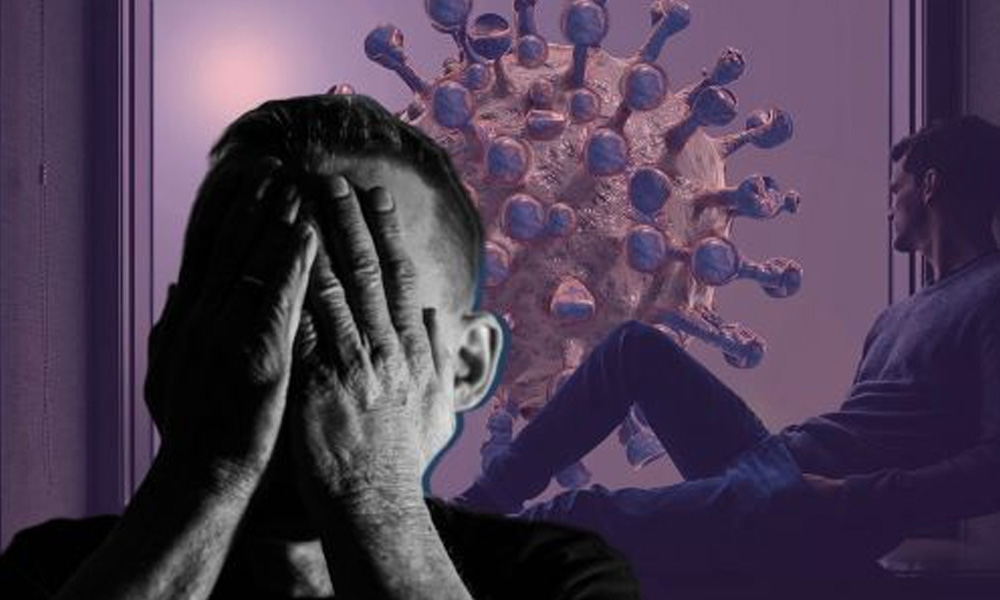
Image Credits: Pixabay
COVID-19 Survivors At Higher Risk Of Mental Health, Neurological Disorders: Lancet Study
Writer: Ankita Singh
A literature lover who likes delving deeper into a wide range of societal issues and expresses her opinions about the same. Keeps looking for best-read recommendations while enjoying her coffee and tea.
India, 7 April 2021 11:34 AM GMT
Editor : Shubhendu Deshmukh |
Shubhendu, the quint essential news junky, the man who loves science and politics in equal measure and offers the complete contrast to it by being a fan of urdu poetry as well.
Creatives : Abhishek M
" An engineer by profession, Abhishek is the creative producer of the team, graphic designing is his passion and travelling his get away. In more ways than one, he makes the content visually appealing."
Nearly one in three COVID-19 survivors was diagnosed with neurological or psychiatric disorders within six months of infection, revealed an observational study published in The Lancet Psychiatry journal.
Nearly one in three COVID-19 survivors was diagnosed with neurological or psychiatric disorders within six months of infection, revealed an observational study published in The Lancet Psychiatry journal.
During the study, the research group observed the health records of more than 2,30,000 patient health records for 14 neurological and mental health disorders.
A previous observational study by the same research group reported that COVID-19 survivors are at increased risk of mood and anxiety disorders in the first three months after they have been infected, reported The Indian Express.
At the same time, until now, there has been no large-scale data examining the risks of neurological as well as psychiatric diagnoses observed in survivors six months after the infection.
This latest study analysed data from the electronic health records of 2,36,379 COVID-19 patients from the US-based TriNetX network that includes more than 8.1 crore people.
In the analysis, patients who were older than 10 years and became infected with the SARS-CoV-2 virus after January 20, 2020, and were still alive on December 13, 2020, were included.
This group of patients was compared with 1,05,579 patients diagnosed with influenza and 2,36,038 patients diagnosed with any respiratory tract infection (including influenza).
The overall estimated occurrence rate of being diagnosed with a neurological or mental health disorder after the COVID-19 infection was 34 per cent.
According to the analysis, for 13 per cent of these people, it was their first recorded neurological or psychiatric diagnosis.
The most common diagnoses after COVID-19 were anxiety disorders that were found in 17 per cent of patients and mood disorders that included 14 per cent of patients.
Apart from this, in the infected patients, substance misuse disorders were reported in 7 per cent and insomnia in 5 per cent.
The incidence of neurological outcomes was lower, including 0.6 per cent for brain haemorrhage, 2.1 per cent for ischaemic stroke, and 0.7 per cent for dementia.
Professor Paul Harrison, the lead author of the study from Oxford University, said, "These are real-world data from a large number of patients. They confirm the high rates of psychiatric diagnoses after COVID-19 and show that serious disorders affecting the nervous system (such as stroke and dementia) occur too. While the latter are much rarer, they are significant, especially in those who had severe COVID-19."
The authors commented that their findings should aid service planning and highlight the need for ongoing research.
The risks of a neurological or psychiatric diagnosis were greatest, but not limited to patients who had severe COVID-19.
Compared to the overall 34 per cent incidence, a neurological or psychiatric diagnosis occurred in 38 per cent of those who had been admitted to hospital, 46 per cent of those in intensive care, and 62 per cent in those who had delirium (encephalopathy) during their infection.
Dr Max Taquet, a co-author of the study from Oxford University, said that the results indicate that brain diseases and psychiatric disorders are more common after COVID-19 than after flu or other respiratory infections, even when patients are matched for other risk factors. He added that now they need to see the results beyond six months.
He also said that the study could not reveal the mechanisms involved but does point to the need for urgent research to identify these, with a view to preventing or treating them.
Also Read: Karnataka Pollution Control Board Launches Web-Based Application To Track Industrial Waste
 All section
All section














